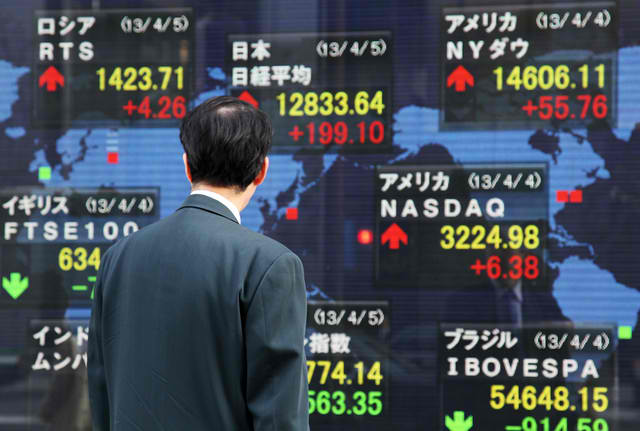
Shares in Asia declined in Monday morning trade after a closely-watched signal of potential recession stateside appeared on Friday.
The broad MSCI Asia-ex Japan index fell 1.42 percent to 522.24, as of 9:50 a.m. HK/SIN.
Stocks in Japan suffered heavily, as the Nikkei 225 in Japan dropped more than 3 percent in the morning, with shares of index heavyweights Fast Retailing, Softbank Group and Fanuc all falling sharply. The Topix index declined 2.69 percent.
Shares in mainland China declined in early trade, with the Shanghai composite, Shenzhen component and Shenzhen composite all declining around 1 percent each.
Meanwhile, the Hang Seng index in Hong Kong dropped 1.73 percent as shares of Chinese tech giant Tencent fell more than 2.5 percent.
Over in South Korea, the Kospi declined 1.53 percent as chipmaker SK Hynix saw its stock plunge around 4 percent.
In Australia, the ASX 200 fell more than 1 percent as almost all sectors saw losses.
Fears of a recession
Stocks stateside fell sharply on Friday as an inverted yield curve stoked fears that an economic recession is on the horizon. Disappointing economic data released Friday out of Europe, coupled with a downgraded economic outlook from the Federal Reserve, added to those concerns.
The spread between the 3-month Treasury bill and the 10-year note went negative on Friday for the first time in more than a decade. Investors consider this to be a signal that a recession may be coming soon.
The inversion in the yield curve was described by one group of strategists as the “biggest development in financial markets for some time.”
“While we prefer the ten‑year minus two‑year measure of the yield curve for predicting U.S. economic recessions some twelve‑to‑eighteen months in advance, the inversion of the tens‑bills curve is an ominous sign,” strategists at the Commonwealth Bank of Australia said in a morning note.
“At this stage, we are not predicting a U.S. recession, but we have already concluded and published that the Fed’s tightening cycle is finished,” they said.
An inverted yield curve occurs when short-term rates surpass their longer-term counterparts, putting a damper on bank lending profits. An inverted curve is also considered a recession indicator.
The U.S. dollar index, which tracks the greenback against a basket of its peers, was at 96.651 after bouncing from lows below 96.3 in the previous session.
The Japanese yen, widely viewed as a safe-haven currency, strengthened to 109.81 against the dollar from lows above 110.6 last Friday. The Australian dollar changed hands at $0.7073 after seeing highs above $0.714 last week.
Meanwhile, top U.S. officials from Washington are also set to visit Beijing later this week to resume trade negotiations with China.
China and the U.S. are expected to strike a deal sometime in April, with the uncertainty surrounding the trade fight between the two economic powerhouses weighing on investor sentiment for much of 2018.
Oil prices slipped in the morning of Asian trading hours, with the international benchmark Brent crude futures contract shedding 0.87 percent to $66.45 per barrel. U.S. crude futures also declined 1.00 percent to $58.45 per barrel.
